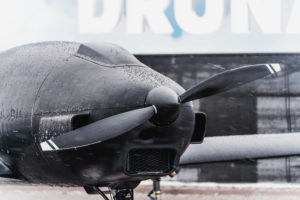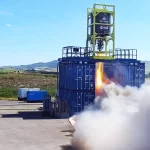Democratising airfreight means lowering costs and ensuring precious cargo can be transported to even the hardest-to-reach regions of the world – a challenge that UK-headquartered Dronamics is embracing with open arms.
The first ever cargo flight took place in 1910, when a Wright Model B aeroplane was used to transport a consignment of silk between Dayton and Columbus, Ohio.
More than a century later, the developer of un-crewed, fuel-efficient cargo aircraft is promising another revolution in the skies that will bring fast and reliable deliveries to remote communities around the globe.
Same-day deliveries at affordable cost
“We are triggering the biggest transformation in the supply chain in 100 years!” Liesl Haris, director of business operations Australia at Dronamics, tells FINN.
“Dronamics is offering a smart all-in-one cargo mobility solution powered by our long-range cargo drone that includes droneports and fully mobile control and cargo systems. An ecosystem with global reach and simple integration to supply chains that enables same-day deliveries at an affordable cost.”
Black Swan
The company’s Black Swan aircraft is designed to land on short and unpaved runways, enabling on-demand point-to-point flights that would otherwise take days to reach over ground or sea.
But what specific benefits can cargo drones bring? “The socioeconomic impact that a long-range cargo drone mobility system like the one Dronamics offers is huge,” Haris says.
“Business owners, farmers and entire communities can have the opportunity to ship and receive goods within hours at an affordable cost, instead of relying on the current air cargo system that is expensive and focused on serving only large hubs at major city airports.
“Dronamics drones can transport a load of 350kg (770lbs) over 2,500km (1,500miles) 80 per cent faster, for a cost that is much lower than other traditional transportation modes, and with less emissions than vans, trucks and aeroplanes.”
All that is required is a 400-metre airstrip – simple infrastructure that is surprisingly common in her native Australia, where huge distances have traditionally meant light aircraft need frequent refuelling stops.

“The Dronamics drone is capable of taking off and landing on pretty much any surface, which means that any remote or regional airfield, even on mountainous or island communities, could become a small cargo hub and benefit from airfreight that is time-efficient, saves costs, and is friendly to the environment,” she explains.
In the UK, Dronamics is already promising to bring those benefits to rural communities.
The company recently announced it would be joining the CAELUS project – a consortium of partners set to shake-up the way in which healthcare services are delivered.
The project will lead to trials of the UK’s first national distribution network using drones to transport essential medicines, blood, organs, and other medical supplies throughout Scotland.
Subscribe to the FINN weekly newsletter

